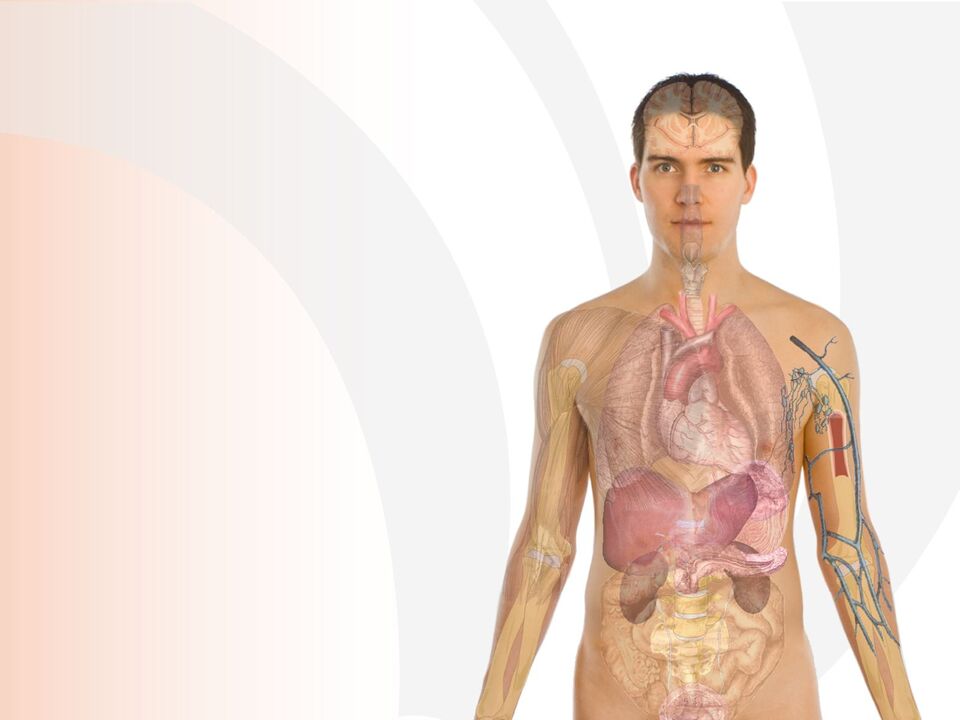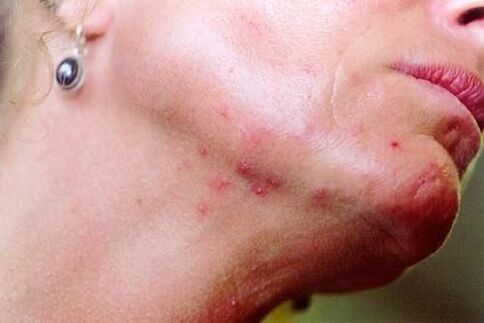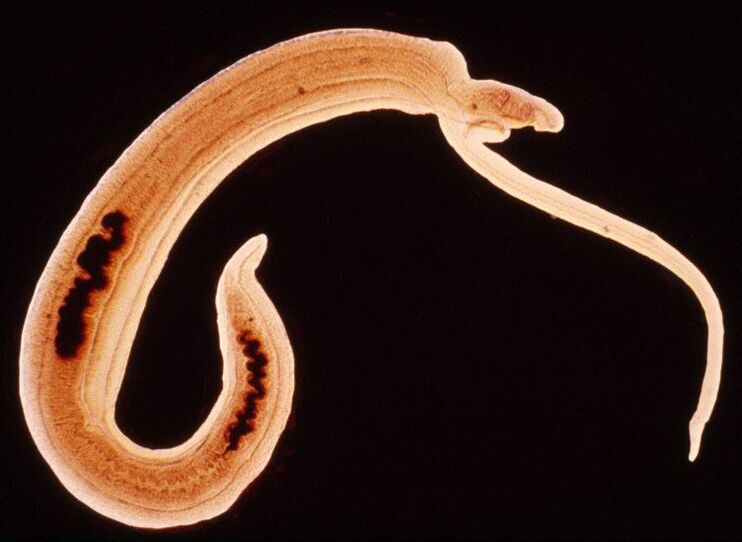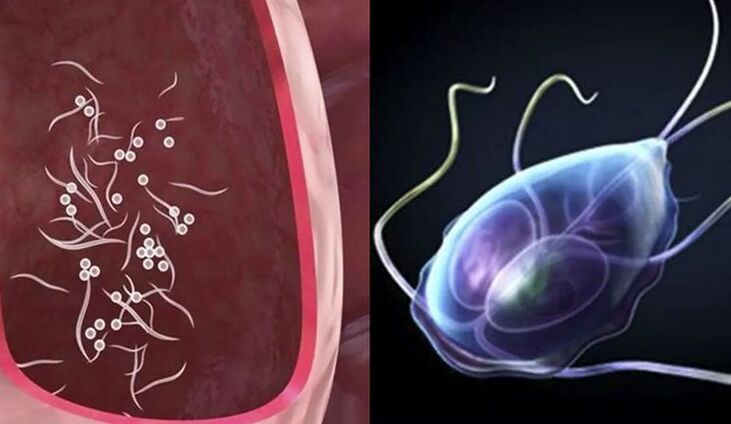The symptoms of worm infection are different. For example, dyspeptic disorders are the most common - nausea, vomiting, abdominal pain and bloating. Some patients do not pay attention to the symptoms until they develop rashes that cannot be treated with conventional medications. Often helminthic infestation is accompanied by symptoms similar to other diseases and allergies. Therefore, timely diagnosis is required.

Infection with worms in humans
Most helminths are spread by eating unwashed fruits and vegetables. After spreading throughout the body, the organs that cause serious diseases are damaged. Liver, kidneys, heart, digestive system, gallbladder, and even oncological pathologies can develop.
Often a characteristic symptom is skin irritation, rash. However, a person may not pay attention to this for years, when the pathology develops, it is enough to take anthelmintic drugs in one course for complete recovery.
Methods of infection
There are 4 ways worms can spread to the human body:
- Geohelminthoses. The parasite enters the soil left on unwashed fruits and vegetables and spreads to the water. Infection is also possible with poor hand washing after working with soil. Animals entering the house with dirty paws often come into contact with the ground. Eggs, larvae, adults can enter the human body.
- Contact. The female lays 4-5 thousand eggs a day in the body of the host. They can pass from an infected person to other people, especially at home. Spread with eggs or adult bedding, towels, personal hygiene items. It is enough for an infected person not to wash their hands. Often this way is characteristic of pinworms, worms.
- Biohelminthoses. Parasites are stored in the bodies of live and dead animals and fish. Then a person can eat them. Inadequate heat treatment protects against parasites.
- Insect bites. In this way, helminth eggs of the smallest size are transmitted.
Infection of all forms of helminths occurs most often with the ingestion of eggs and larvae. They can be found in soil, water, sick people, raw meat. It is important not only to eat and wash your hands, but also to always use heat treatment for eating.

Symptoms of helminthiasis
Symptoms of infestation vary depending on the stage of the disease.The following symptoms often appear:
- weight loss, weight loss;
- pale skin;
- itching in the anus.
The symptoms are similar to other pathologies, so the patient may use the wrong therapies. Symptoms may vary depending on the area of the affected body. For example, damage to the liver causes yellowing of the skin.
Dysfunction of the gastrointestinal tract
With the penetration of pathogens into the digestive system, the following symptoms develop:
- violation of the formation of fecal masses (constipation, diarrhea);
- itching in the anus;
- dyspeptic disorders - nausea, vomiting, abdominal pain, heartburn;
- colic in the intestines;
- flatulence accompanied by swelling;
- periodic changes in body weight to a greater or lesser extent.
In the early stages, the symptoms are almost invisible. The more damage the worms cause to the internal organs, the more actively the symptoms develop. Some parasites are able to secrete waste products that are foreign to the body. This causes severe intoxication and diarrhea. Large worms spread to the intestines and prevent the passage of feces. This causes constipation.
A person is severely intoxicated due to the release of worm waste products. Therefore, weakness, dysfunction, dyspeptic disorders develop.
Suppression of immunity
When a person eats food, nutrients enter the body and are distributed to all tissues.Helminths eat them, so the patient develops the following deviations:
- hypovitaminosis;
- metabolic disease;
- suppression of the immune system.
A person often begins to suffer from viral, active, fungal diseases. Even with the use of multivitamins, hypovitaminosis will not be eliminated until anthelmintic treatment is completed.
Neurological disorders
Some types of helminths can cross the blood-brain barrier and damage peripheral tissues of the nervous system. These properties are possessed by their intoxication products.Damage to the nervous system causes the following symptoms:
- permanent forgetfulness, poor memory;
- migraine headaches;
- dizziness;
- stress, neurosis, depression;
- increased fatigue.
The patient's behavior changes. He gets into a conflict with the people around him and forgets his acquaintances. Gradually, the symptoms subside, and the body temperature rises above 39 degrees.

Chronic hypovitaminosis causes chronic fatigue syndrome. Gradually, the level of red blood cells decreases, causing anemia. The person becomes nervous and aggressive.
Respiratory disorders
Even in the early stages, damage to the deepest parts of the respiratory tract can develop.The following pathologies develop:
- tracheitis, bronchitis;
- emphysema, bronchial asthma, pneumonia.
Rhinitis and pharyngitis can even be a sign of helminthic invasion.
Skin problems
Adequate amounts of vitamins, trace elements and minerals are required for the normal development of the epidermis. Worm infestation leads to hypovitaminosis, so the quality of the skin suffers.The following deviations appear:
- acne, pimples, rashes;
- itching, peeling, redness of the epidermis;
- nail plate erosion.
Even the most severe skin pathologies can develop:
- urticaria, dermatitis;
- papilloma, seborrhea;
- allergic reaction.
Physicians and patients may not immediately understand why medications do not help these pathologies. The quality of the skin deteriorates significantly, pale, wrinkles appear. Turgor decreases, ie surface tension.

Signs of infection depending on the type of helminths
The severity of symptoms depends on the following factors:
- number of parasites in the body;
- degree of immunity activity;
- localization of parasites;
- type of parasite.
Some helminths can host for a long time without causing negative symptoms. Other people can immediately deteriorate their health and damage the liver. For example, a round worm.
Round worm
Ascaris damages many internal organs, causing certain symptoms similar to other diseases.The following symptoms may appear:
- hyperthermia;
- prolonged cough;
- severe fatigue;
- bronchitis, pneumonia.
First, the digestive system is damaged, so hypovitaminosis and metabolic disorders occur. The human body is depleted. Gradually, signs of damage to the gastrointestinal tract appear:
- jaundice of the skin;
- intestinal obstruction.
Severe headaches, migraines, and depression appear as the worms spread through the blood-brain barrier.
Schistosomiasis, trichuria, hookworm, diphyllobotriasis
Parasites cause the following deviations:
- food and vitamin deficiencies;
- decrease in metabolism leading to changes in body weight;
- intestinal dysbiosis.
Gradually, hypovitaminosis turns into beriberi, which leads to significant depletion of the body. A person's skin becomes pale and can often lose consciousness, which is characteristic of anemia.
Pinworms
Pinworms are characterized by the collapse of eggs in the anus, this process usually occurs at night. Therefore, a person is worried about severe itching in the anus. The disease is characterized by periodic remission, so sometimes the itching stops. In the absence of treatment, helminthic infestation expands, so itching bothers the patient at any time of the day.
Trichinosis
The parasite penetrates any part of the body and releases large amounts of toxins. It causes constant spasms, cramps, muscle pain. Edema occurs due to damage to the cardiovascular system. With severe intoxication, body temperature rises.
Fascioliasis, opisthorchiasis, clonorrhea
This is one of the most dangerous helminths that causes the following lesions:
- difficulty in the liver with the development of jaundice;
- intestinal obstruction, dyspeptic disorders that spread throughout the gastrointestinal tract.
The patient gradually develops hepatosplenomegaly.
Urogenital schistosomiasis

Parasites are actively spread through the genitourinary system. Damage to the mucous membranes occurs due to the chronic inflammatory process. Therefore, when urinating, a person detects red urine, which indicates the development of bleeding foci.
Worm habitats
Helminths in the human body can damage various organs:
- vlasoglav - large intestine;
- ascaris, tapeworm, ankilis worms - small intestine;
- round worm - liver.
Depending on the damaged organs, different symptoms occur:
- liver - jaundice, pain in the right hypochondrium, hepatitis;
- respiratory tract - trachea, bronchitis, pneumonia;
- brain - convulsions, paresthesia, fainting.
Simultaneous treatment of the disease (hepatitis, colitis), elimination of helminths is required.

Common helminths
Scientists estimate that there are many parasites in the human body. There are more than 100 of them.However, more often doctors distinguish the infection with the following parasites:
- pinworm;
- dwarf tapeworm;
- tapeworm;
- corn worms;
- whip;
- paraconimiasis;
- cysticercosis.
Laboratory and instrumental diagnostics should be performed to determine the exact type of pathogen and to determine the correct treatment. First the patient is examined by a therapist, then he gives a coprogram, feces for the detection of worm eggs. Usually, therapists and infectious disease specialists recommend a double examination, because even if an infection is present, eggs and larvae cannot be detected.
Laboratory blood tests are recommended for at-risk patients:
- the presence of pets;
- animal work;
- medical workers;
- employees of children's educational institutions;
- food workers.
Attention! Enzyme-linked immunosorbent assay is recommended to accurately identify helminths and their intoxication products. It is carried out in municipal clinics and hospitals, as well as in private laboratories.
Therapy methods
It is forbidden to choose drugs against helminths independently, because they have a strong effect on the condition of the liver and kidneys. It is recommended to undergo an initial examination, after which special medications are prescribed. The dosage is selected depending on the state of health, age and body weight of a person.
The following methods of drug administration are selected:
- tablets - mild or moderate helminthiasis;
- injections, infusions - the severity of the disease, the formation of an excessive number of parasites, severe damage to the digestive system.
Many medications can only affect adults. If there is a risk of eggs and larvae, it is better to undergo a second course of therapy or choose a stronger tool.
The table shows the optimal drugs for treatment.
| Article | Impact |
| mebendazole | Completely kills pinworms, hookworms, whipworms, tapeworms and other parasites. |
| Pyrantela pamoate | The substance kills roundworms, which are effective in enterobiasis and necrosis |
| Levamisole hydrochloride | Destroys roundworms and cornworms |
| Pirvinia embonate | Helps complete recovery of enterobiasis |
| Albendazole | Helps destroy most of the elements during puberty or larval stage. |
It is recommended to first accurately identify the pathogen, and only then apply the drug. This will increase the chances of recovery without adversely affecting the body.
Methods of prevention
Use prevention rules to prevent parasites from entering the body:
- hand washing after coming home, during the day, after contact with animals;
- use of personal hygiene items, utensils by only one person;
- to take multivitamins to strengthen the immune system, to give up bad habits;
- thorough washing of fruits and vegetables, heat treatment of meat and fish;
- use of high quality drinking water from proven sources.

Helminths can be found in many products, so it is impossible to rule out the risk of their spread in the body. Anyone can become infected without knowing it. It can be passed from one family member to another in contact with households. Therefore, it is necessary to use preventive measures on a daily basis.
It is important to take good care of animals. To reduce the risk of infection with helminths, it is necessary to wash them regularly and give them medicine from parasites.
If a person suspects that they are infected with helminths, it is better to undergo a timely laboratory examination. Repeat twice to avoid a false negative test. Spontaneous use of drugs is prohibited. All of them are strong and have a negative effect on the liver. Only a doctor will be able to choose the optimal anthelmintic agent in the right dose. With timely treatment, it is possible to prevent the development of serious diseases and immunodeficiency.
























